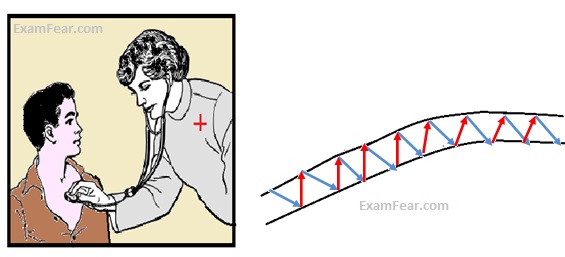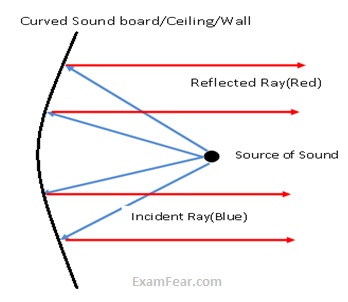Class 9 Science
Sound

Reverberation : Multiple Reflections
In a big hall, where there a musical concerts/dance shows etc, there will be repeated reflections from walls all round. The sound will persist for a very long time due to this multiple reflections. The repeated reflection that results in this persistence of sound is called reverberation.
In a big hall, reverberation is required so that the entire hall can hear the sound. At the same time, if the reverberation is very high, the sound will persist for too long even if the source of sound has actually stopped. So, this is undesirable. The reverberation effect should be controlled. Several acoustic techniques are deployed to do this.
Uses of Multiple Reflection
- Some musical instruments have a tube followed by a conical opening. This architecture helps to reflect sound again and again such that most of the sound waves move in the forward direction. Eg: Horn, Trumpets, Loud speakers etc

- Stethoscope is used by a doctor to hear the patient's heart beat. The sound from the heart reaches the ear of the doctor by multiple reflections as shown.

- The walls and ceiling of concert halls are curved because of which sound after reflection reaches all corners of the hall. Also, roof and walls and seats of the auditorium are generally covered with sound-absorbent materials like compressed fireboard, rough plaster and draperies for a pronounced sound effect

Class 9 Science Sound NCERT Chapter 12 Free Notes for Best Revision
Revision of Class 9 Science Sound is a crucial aspect of effective learning. Revision plays a vital role in the learning process and is especially important before exams. Here are some key points you can consider emphasizing in your content:
- Retention and Memory: Regularly reviewing and revisiting the material of Class 9 Science Sound helps reinforce the concepts in students' minds. It strengthens memory pathways, making it easier to recall information during exams and beyond.
- Consolidation of Knowledge: When you revise notes, you are essentially consolidating your knowledge. This means connecting new information with what you already know, making the overall understanding more robust.
- Identifying Knowledge Gaps: Revision allows students to identify any gaps in their understanding or areas where they need further clarification. This gives you a chance to seek help or delve deeper into those topics. For detailed understanding, you can always refer to the videos of Sound Class 9 Science NCERT Chapter 12 on LearnoHub.com
- Building Confidence: As you revise Sound Class 9 Science and become more familiar with the content, your confidence in your abilities grows. Confidence is a crucial factor in exam performance as it reduces anxiety and allows you to approach exams with a positive mindset.
- Different Revision Techniques: Use a variety of revision techniques such as summarizing notes, creating flashcards, practicing past papers, discussing concepts with peers, and teaching others. Different techniques work for different students, and it's essential to find what suits you the best. You can also attend the LIVE Revision classes on LearnoHub.com or watch the LIVE Revision Race videos of LearnoHub on Sound Class 9 Science NCERT Chapter 12.
- Spacing Effect: Spacing out revision sessions over time, rather than cramming all at once, has been shown to improve long-term retention. Create a revision schedule leading up to the exams to allow for spaced practice.
- Regular Revision over Cramming: Regular and consistent revision throughout the academic year is very important. Waiting until the last moment to cram everything can be overwhelming and less effective than spaced-out revision.
- Self-Assessment: Assess your understanding periodically through quizzes or self-tests. This helps you to gauge your progress and identify areas that need further attention. Refer Class 9 Sound Online Tests.
- Balanced Approach: Remind students to strike a balance between revision and other activities. Adequate rest, exercise, and relaxation are essential for optimal learning and performance.
- Seeking Help: If you face difficulties during the revision process, Refer the videos of Class 9 Science Sound. Clearing doubts promptly is crucial for a better grasp of the subject matter. You can always ask your doubts on Sound Class 9 Science NCERT Chapter 12. “Ask a Question” section of LearnoHub.com
By highlighting the benefits and strategies of effective revision, you can approach your studies more mindfully and achieve better results in your exams. Best of luck bachhon!
Class 9 Science seems to be a quite difficult subject for a lot of students. But, if you get a very good conceptual understanding of the subject, it can be very interesting for you.
We, at LearnoHub, will give our best to make Class 9 Science Sound NCERT Chapter 12 super-duper easy for you.
We aim at making learning fun as well as engaging for you with our complete end-end learning content with Sound Class 9 Science Best videos, Notes, NCERT pdf, NCERT complete syllabus, tests and Practice Questions.
Always remember, it is very important to study with full concentration during Revision. Here are a few tips for you on how to revise with full focus:
- Create a Distraction-Free Environment: Find a quiet and comfortable place to study where you can minimize distractions. Turn off or silence your phone, log out of social media accounts, and inform others around you that you need uninterrupted study time. A dedicated study environment will help you focus better.
- Set Specific Goals: Before starting your study session, set clear and achievable goals. Break down your study material into smaller tasks, and plan what you want to accomplish during each session. Having specific goals will give you a sense of direction and purpose, making it easier to concentrate.
- Use the Pomodoro Technique: The Pomodoro Technique is a time management method that involves studying in short, focused intervals, typically 25 minutes, followed by a short break of 5 minutes. After completing four sessions, take a longer break of around 15-30 minutes. This technique can improve focus and productivity by providing regular breaks to recharge.
- Stay Organized: Keep your study materials, notes, and resources well-organized. Having everything you need at hand will save time and reduce distractions caused by searching for materials. Use color-coded folders or digital tools to maintain a structured study system.
- Practice Mindfulness and Meditation: Before you begin studying, take a few minutes to practice mindfulness or meditation. Deep breathing exercises and clearing your mind of distractions can help you approach your study session with a calm and focused mindset.
Remember, studying with full concentration is a skill that takes time and practice to develop. If you find your mind wandering during study sessions, gently bring your focus back to the task at hand and be patient with yourself. With consistent effort, you can improve your ability to concentrate and make the most of your study time.
Last but not the least, To get the best hold on Class 9 Science Sound Book Chapter 12. Do not forget to check out:
- Sound Class 9 Science Best videos
- Sound Class 9 Science NCERT Solutions
- Class 9 Science Sound Revision notes
- Sound Class 9 Science DPPS, Download PDF of solutions
- Class 9 Science Sound Online Tests
- Class 9 Science Sample papers